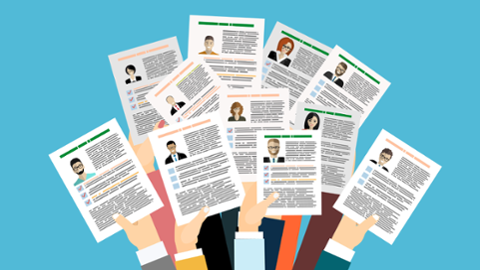The job hunt is always a complex, often prickly process. It’s hard to fire off applications and wait for a response, and even harder to negotiate your way through a job interview (as well as the compensation negotiations if you’re lucky enough to land a gig).
If you mess up at some point along the way, that’s okay: everyone makes mistakes, whether it’s an innocent typo on a cover letter or accidentally forgetting an answer during a whiteboard test (hopefully you showed your work; interviewers often give partial credit if you can show your thought process). But no matter what happens, make absolutely sure you don’t make these truly catastrophic errors:
“Social Bombing” Your Résumé Around
So you’re on the job hunt. You’ve spent hours—maybe even days—carefully revising your résumé and cover letter. But then you make a critical mistake: instead of sending your specially-tailored résumé to a job that interests you, you decide to bomb it to every single contact in your social networks and email address book. “Looking for a job,” you write in the accompanying message. “ANY HELP APPRECIATED.”
You might think this “social bombing” is an efficient way of expanding your job hunt, by putting your materials in front of dozens of people who can (hopefully) put in a good word with a company (if not hire you themselves). Instead, you’ve just managed to annoy everyone who could potentially help you.
Nobody likes unsolicited queries. They clog up email and direct-messaging boxes, and make people feel like they’re being exploited for their position or connections. If such a query appears as part of a social-media feed, people are likely to scroll right past—if the platform’s algorithm lets them see it at all.
Bombing your materials to as many folks as possible rarely helps—and often hurts. Your best course of action is to always research the best opportunities and tailor your application accordingly. Besides, what if one of your contacts did offer you a job on the spot—and it turned out to be something you absolutely hated? Turning it down would be awkward as heck.
Not Telling Your References About Your Hunt
References are key aspects of the job hunt, no matter what your stage in the career cycle. They also like knowing they’re a part of your job hunt. Before you give someone’s name, email, and phone number to a hiring manager or recruiter for a reference check, you need to make sure that reference knows they’re going to receive an email or call from a random person about your future employment.
Just think about it: the best-case scenario here is that your reference, upon receiving that out-of-the-blue call, rolls with it and gives you a sterling recommendation, then doesn’t give you too hard a time about it afterward. Worst-case scenario, they deep-six your job hunt by telling your prospective employer that you’re a terrible human being (purely out of spite).
Asking for a reference is a quick process, and people are usually only too happy to help out. Also, if someone agrees to become a reference, send them a nice thank-you note after you land the job.
Letting the Process Control You
We get it: job hunting is an overwhelming process. It’s easy to find yourself carried under by a wave of emotions—sadness, anger, fear, even elation when you seem to have a lock on a position that you really want (and let's not forget about imposter syndrome). It’s also important that you keep a level head at all times, especially when interacting with recruiters and hiring managers—you don’t want an accidental outburst (“I HATE HUNTING FOR JOBS!”) to color your chances of landing a position.
Dropping Formality
It’s true: offices have become progressively less formal over the past few decades. In some ways, that’s a good thing: Precious few people probably liked dressing up in a three-piece suit to head to their desk.
Despite that, some measure of formality is still expected. When interacting with recruiters, hiring managers, and interview panels, it really pays to keep that in mind. That means keeping your emails and letters formal, and policing your speech somewhat during interviews (see also: keeping your emotions in check). You shouldn’t be robotic—warmth and personality go a long way—but you shouldn’t start off an email to a prospective employer with “Hey.”
Misusing Contacts You Haven’t Spoken to in Years
People come and go in our lives, and that’s OK! What’s not OK is approaching someone you haven’t talked to in years, and immediately hitting them up for a job. By doing so, you’re saying that you see the relationship as purely transactional—and folks don’t really respond well to that sort of thing.



